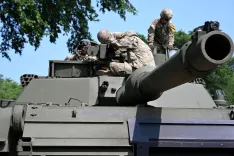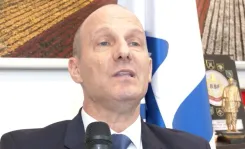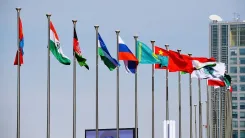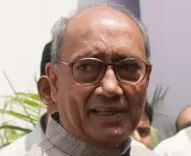Does France Support Israel's Right to Self-Defense Against Nuclear Threats?
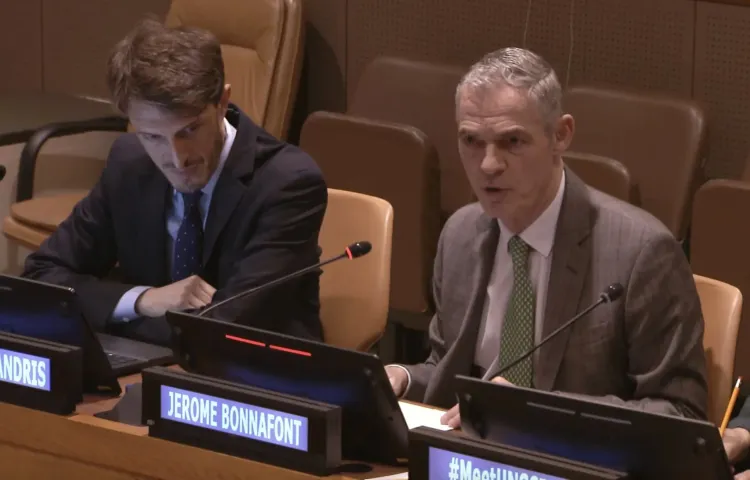
Synopsis
In a critical moment for international relations, France has reiterated its support for Israel's right to self-defense amid escalating tensions with Iran. As Iran advances its nuclear program, the implications for global peace and regional stability are profound. Explore the diplomatic efforts and military actions that are shaping this ongoing conflict.
Key Takeaways
- France supports Israel's right to self-defense against Iranian nuclear threats.
- The Iranian nuclear program is seen as a significant threat to regional and global stability.
- Diplomatic efforts are being made by France and its allies to de-escalate tensions.
- 'Operation Rising Lion' signifies Israel's commitment to addressing perceived threats.
- International reactions emphasize the need for restraint and dialogue.
New York, June 14 (NationPress) France's Permanent Representative to the United Nations, Ambassador Jerome Bonnafont, has reiterated Israel's right to defend itself and ensure its safety amidst the ongoing conflict with Iran.
During an emergency session of the UN Security Council addressing the Iran-Israel tensions, the Ambassador highlighted France's ongoing concerns regarding the intensification of Iran's nuclear program. He emphasized that Iran's nuclear advancement poses a serious threat to both European security interests and global peace.
"The presence of nuclear weapons in Iran would destabilize the region and increase the risk of further proliferation. The Iranian nuclear initiative has reached unprecedented levels and lacks any credible civilian rationale. Recently, Iran has announced enhancements to its enrichment capabilities and the establishment of new infrastructure for this purpose. Moreover, its ballistic missile activities continue to destabilize not just the region but potentially European territories as well," remarked Bonnafont.
France has called for stability in the Middle East and urged all parties to practice maximum restraint and work towards de-escalation. During the session, Bonnafont expressed France's readiness, alongside its partners, to support efforts to de-escalate tensions.
"France's commitment to diplomacy remains steadfast in collaboration with its E3 partners (France, Germany, and the United Kingdom) and in close coordination with the United States," he stated.
On Friday, French President Emmanuel Macron condemned Iran's nuclear program and reaffirmed Israel's right to self-defense.
"France has consistently denounced Iran's ongoing nuclear ambitions and has taken appropriate diplomatic actions in response. In this context, we reaffirm Israel's right to self-defense to ensure its security. To prevent jeopardizing the stability of the entire region, I urge all parties to exercise maximum restraint and work towards de-escalation. Following recent Israeli strikes on Iran and its nuclear program, I convened the National Defence and Security Council this morning. All necessary measures will be undertaken to protect our citizens and diplomatic missions in the region, as well as our national territory and fellow citizens," he stated in a post on X.
"France is prepared to collaborate with all its partners to advocate for de-escalation in the Near and Middle East. Today, I spoke with the Crown Prince of Saudi Arabia, the King of Jordan, the President of the United Arab Emirates, the Emir of Qatar, the German Chancellor, the British Prime Minister, and the President of the United States. Peace and security for all in the region must remain our guiding principle," he added.
Israeli Prime Minister Benjamin Netanyahu announced on Friday the initiation of 'Operation Rising Lion', a targeted military operation aimed at countering the Iranian threat of nuclear weapons to Israel's existence. He asserted that the operation will proceed for as long as necessary to eliminate the threat.
Tensions in the Middle East escalated further on Saturday as Iran launched a new wave of missile attacks on Israel. This renewed offensive occurs amidst a backdrop of heightened hostilities between the two nations.
The Israel Defence Forces (IDF) confirmed the attack, stating that a barrage of projectiles had been directed toward Israeli territory.
In a brief statement, the military confirmed, "another barrage has been fired towards Israel," though the total number of missiles and specific target areas were not immediately disclosed.

